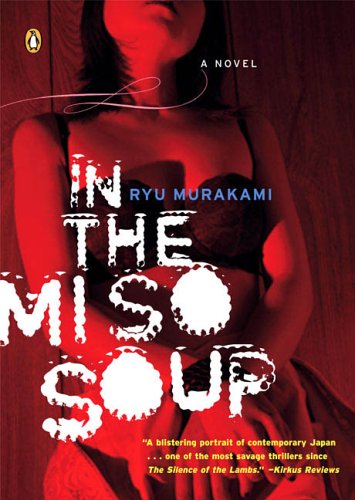 In the Miso Soup has been called many things, most of them not true. You’ll hear it called, over and over, “The Japanese [Something]”. The Japanese Silence of the Lambs. The Japanese American Psycho (hey, I can grok it). Et cetera. None hit really close to the truth, which is fitting, because the novel’s about looking the other way, and deliberately missing the point.
In the Miso Soup has been called many things, most of them not true. You’ll hear it called, over and over, “The Japanese [Something]”. The Japanese Silence of the Lambs. The Japanese American Psycho (hey, I can grok it). Et cetera. None hit really close to the truth, which is fitting, because the novel’s about looking the other way, and deliberately missing the point.
The story isn’t much. It’s barely even a story. Kenji is a sex tourism guide for thrill-seeking gaijin, and he ends up working for a genuinely odd duck called Frank, an American who claims to be missing a section of his brain, and who might just be the serial killer stalking Shinjuku. Kenji and the rest of the story’s characters (including his girlfriend Jun) struggle to be two dimensional, and mostly exist as sounding boards and emotional foils for Frank, who carries the bulk of the story.
Frank’s a kind of prism through which we see the various contradictory aspects of Japanese society. Prudish, conservative…but you’d never see groups of schoolgirls selling sex to middle aged men in the United States. The idea that Japan embodies “too much, yet too little” has been done before, but Murakami bulldozes it into your head. Frank’s behavior seems abhorrent, but it doesn’t seem implausible that he’d go to Japan to commit these acts, rather than another country. Frank and Japan seem to fit together, in a weird way.
In the Miso Soup plays pretty loose ball with conventions on how to structure a novel. The big climax hits exactly halfway through, and much of the rest of novel is spent in incessant talkiness. Western gore porn novels make a mess and then fade to black. This novel deigns to show the emotional clean-up process afterwards, as well. There’s long periods of didacticism: at a certain point comparisons to Sade seem apt, as Murakami virtually forgets he’s telling a story and just directly reads you the riot act on some philosophical ideas for a page or two.
But the ideas are all compelling and heartfelt ones. Like the more famous Murakami, sometimes you can’t discern what his exact point is, but you can tell there always is one.
Props are due to translator Ralph F. McCarthy, who avoids the tin-eared “upmarket Babelfish” tone Japanese to English novels can sometimes have, and makes the prose eerie, uneasy, and alive. In his hands, Murakami’s version Shinjuku becomes a neon-lit abattoir that disturbs, unsettles, and most of all, convinces. Sometimes Japanese novels hold English readers at arms length because of the translation. Here, it doesn’t, no matter how much you might wish it so.
It’s not especially similar to any Western novel I can recall reading. At certain points, it’s even hard to tell if you’re having a good time. But if you want a compelling journey through the grease-traps of Japanese society, Murakami’s work is very thick soup indeed.
No Comments »
Comments are moderated and may take up to 24 hours to appear.
No comments yet.
